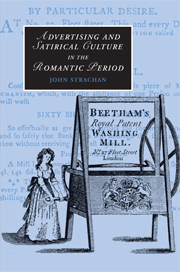Book contents
- Frontmatter
- Contents
- List of illustrations
- Acknowledgements
- Introduction
- 1 A ‘department of literature’: Advertising in the Romantic period
- 2 ‘Humbug and Co.’: Satirical engagements with advertising 1770–1840
- 3 ‘We keeps a poet’: Shoe blacking and the commercial aesthetic
- 4 ‘Publicity to a lottery is certainly necessary’: Thomas Bish and the culture of gambling
- 5 ‘Barber or perfumer’: Incomparable oils and crinicultural satire
- 6 ‘The poetry of hair-cutting’: J. R. D. Huggins, the emperor of barbers
- Conclusion: ‘Thoughts on puffs, patrons and other matters’: Commodifying the book
- Notes
- Bibliography
- Index
- CAMBRIDGE STUDIES IN ROMANTICISM
4 - ‘Publicity to a lottery is certainly necessary’: Thomas Bish and the culture of gambling
Published online by Cambridge University Press: 22 September 2009
- Frontmatter
- Contents
- List of illustrations
- Acknowledgements
- Introduction
- 1 A ‘department of literature’: Advertising in the Romantic period
- 2 ‘Humbug and Co.’: Satirical engagements with advertising 1770–1840
- 3 ‘We keeps a poet’: Shoe blacking and the commercial aesthetic
- 4 ‘Publicity to a lottery is certainly necessary’: Thomas Bish and the culture of gambling
- 5 ‘Barber or perfumer’: Incomparable oils and crinicultural satire
- 6 ‘The poetry of hair-cutting’: J. R. D. Huggins, the emperor of barbers
- Conclusion: ‘Thoughts on puffs, patrons and other matters’: Commodifying the book
- Notes
- Bibliography
- Index
- CAMBRIDGE STUDIES IN ROMANTICISM
Summary
A world of words, tail foremost, where
Right – wrong – false – true – and foul – and fair
As in a lottery-wheel are shook.
P. B. Shelley, Peter Bell the Third (1819)In evidence given to the Parliamentary Committee on the Laws relating to Lotteries on 7 April 1808, the lottery-office entrepreneur and indefatigable self-publicist Thomas Bish declared that ‘Publicity to a Lottery is certainly necessary’. This chapter addresses that publicity, focusing most particularly upon a fascinating but little-known moment in English social history: the final draw of the English State Lottery, which was held in October 1826. It also pays much attention to Bish himself, as the figure most associated with the lottery in the minds of the contemporary English public. The proprietor of lottery offices at Cornhill, Charing Cross and in several provincial cities, Bish became a figure of some fame and notoriety in the early part of the nineteenth century on account of his striking lottery puffs. Here I examine his promotional methods, contextualise them against the background of the increasing middle-class disapproval of lotteries which led to their eventual abolition, and discuss the satirical response to the abolition of the lottery, to Thomas Bish, and to the final draw – the ‘Last, the downright Last’ as S. T. Coleridge called it, a body of work to which such important Romantic period figures as Charles Lamb and Thomas Hood made significant contributions.
- Type
- Chapter
- Information
- Advertising and Satirical Culture in the Romantic Period , pp. 162 - 203Publisher: Cambridge University PressPrint publication year: 2007

